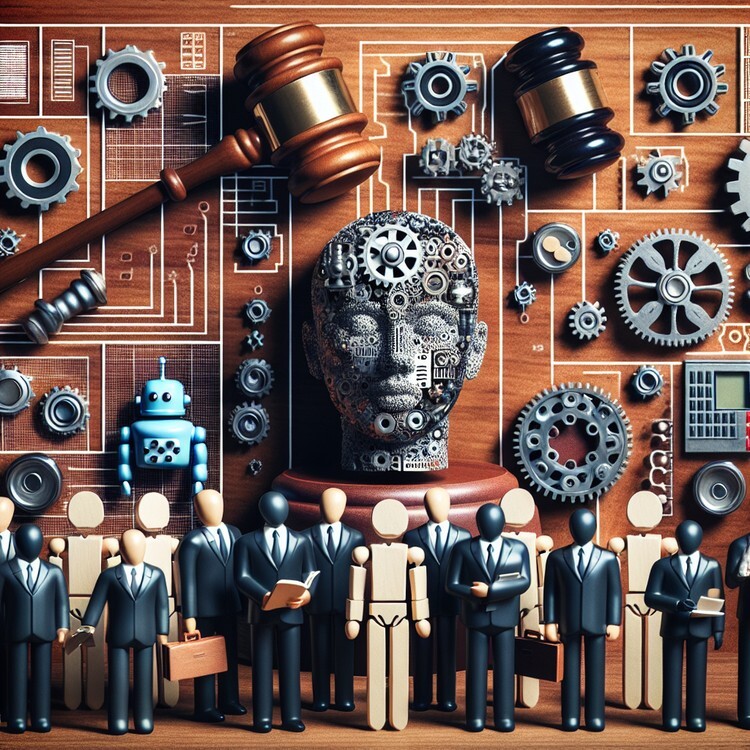The European Union (EU) has reached a significant agreement on the regulation of artificial intelligence (AI), making it the first comprehensive set of laws in the world to govern AI use. After 36 hours of negotiations, rules have been established for AI systems such as ChatGPT and facial recognition. The AI Act proposals will be voted on by the European Parliament early next year, but the legislation will not come into effect until at least 2025. The United States, United Kingdom, and China are also in the process of developing their own guidelines for AI.
The proposed regulations include safeguards for AI use within the EU and limitations on its adoption by law enforcement agencies. Consumers will have the right to file complaints, and fines may be imposed for violations. EU Commissioner Thierry Breton described the plans as “historic” and emphasized that they provide clear rules for the use of AI. He also highlighted that the regulations serve as a launch pad for EU start-ups and researchers to lead the global AI race. European Commission President Ursula von der Leyen stated that the AI Act will support the development of technology that does not compromise people’s safety and rights, calling it a unique legal framework that can be trusted.
According to the European Parliament, AI is defined as software capable of generating outputs, such as content, predictions, recommendations, or decisions, that influence the environments they interact with, based on human-defined objectives. ChatGPT and DALL-E are examples of “generative” AI, which learn from large amounts of data, such as online text and images, to create new content that resembles human-made content. Chatbots, like ChatGPT, can engage in text conversations, while AI programs like DALL-E can generate images based on simple text instructions.
In conclusion, the EU has made a landmark agreement on the regulation of AI, becoming the first region to establish comprehensive laws in this field. The proposed regulations aim to protect consumers and limit the use of AI by law enforcement agencies. The European Parliament will vote on the AI Act proposals, which are expected to come into effect in 2025. This agreement is seen as a significant milestone and a platform for EU start-ups and researchers to lead the global AI race.
Original news source: AI: EU agrees landmark deal on regulation of artificial intelligence (BBC)
Listen:
Slow
Normal
Fast
Vocabulary:
| 1 | regulations | Official rules or laws that control or govern something |
| 2 | comprehensive | Including everything or nearly everything |
| 3 | legislation | The process of making or enacting laws |
| 4 | guidelines | Instructions or principles that indicate how something should be done or operated |
| 5 | safeguards | Measures taken to protect or prevent harm or damage |
| 6 | limitations | Restrictions or restrictions on something |
| 7 | violations | The act of breaking or failing to comply with a rule or law |
| 8 | framework | A basic structure or system that provides support or guidance |
| 9 | objectives | Goals or aims that someone works towards or intends to achieve |
| 10 | generative | Producing or creating something, especially by using a process or method |
| 11 | content | Information or material that is created or produced |
| 12 | resemble | To be similar to or have a likeness to something or someone |
| 13 | milestone | An important event or stage in the development or progress of something |
| 14 | platform | A foundation or base that provides a means for growth or development |
| 15 | race | A competition or contest to achieve a particular objective or goal |
Group or Classroom Activities
Warm-up Activities:
– News Summary
Instructions: Divide the class into pairs or small groups. Give each group a copy of the article. Instruct them to read the article and then work together to write a concise summary of the key points. After a set amount of time, have each group share their summary with the class.
– Opinion Poll
Instructions: Write a series of questions related to the article on the board, such as “Do you think the EU’s regulations on AI are necessary?” or “Should other countries follow the EU’s lead in regulating AI?” Divide the class into pairs or small groups and have them discuss the questions and share their opinions. After the discussion, conduct a class poll to see the overall opinions of the students.
– Word Association
Instructions: Choose a keyword from the article, such as “regulation” or “AI.” Write it on the board and have the class brainstorm as many related words or phrases as they can in a set amount of time. Encourage them to think creatively and make connections between the words. After the brainstorming session, discuss the associations as a class and see how many unique ideas they came up with.
– Sketch It
Instructions: Divide the class into pairs. Give each pair a different concept or idea from the article, such as “facial recognition” or “AI ethics.” Instruct them to work together to create a visual representation or sketch of the concept. After a set amount of time, have each pair present their sketch to the class and explain their interpretation.
– Speed Summarizing
Instructions: Divide the class into two teams. Assign each team a different section of the article, such as the introduction or the proposed regulations. Instruct the teams to read their assigned section and then prepare a brief summary. Once they are ready, have the teams take turns presenting their summaries to the class. Encourage them to be concise and clear in their delivery. After each presentation, have the opposing team ask one question about the section to test their understanding.
Comprehension Questions:
1. What is the significance of the EU’s agreement on the regulation of artificial intelligence?
2. What are some examples of AI systems that will be regulated under the new laws?
3. When will the legislation come into effect?
4. Which other countries are also developing their own guidelines for AI?
5. What safeguards are included in the proposed regulations for AI use within the EU?
6. What rights will consumers have under the new laws?
7. How does the European Commission President describe the AI Act?
8. How is AI defined by the European Parliament?
Go to answers ⇩
Listen and Fill in the Gaps:
The European (1)______ (EU) has reached a significant (2)______ on the regulation of artificial intelligence (AI), making it the first comprehensive set of laws in the world to govern AI use. After 36 hours of negotiations, rules have been established for AI systems such as ChatGPT and facial recognition. The AI Act proposals will be voted on by the European Parliament early next year, but the legislation will not come into effect until at least 2025. The United (3)______, United Kingdom, and China are also in the process of developing their own (4)______ for AI.
The proposed regulations include safeguards for AI use within the EU and (5)______ on its adoption by law enforcement agencies. Consumers will have the right to file complaints, and fines may be (6)______ for (7)______. EU Commissioner Thierry Breton described the plans as “historic” and emphasized that they provide clear rules for the use of AI. He also (8)______ that the regulations serve as a launch pad for EU start-ups and researchers to lead the global AI race. European Commission President Ursula von der Leyen stated that the AI Act will support the development of technology that does not compromise people’s (9)______ and rights, calling it a unique legal framework that can be trusted.
According to the European Parliament, AI is defined as software capable of generating outputs, such as (10)______, predictions, recommendations, or decisions, that influence the environments they interact with, based on human-defined objectives. (11)______ and DALL-E are examples of “generative” AI, which (12)______ from large amounts of data, such as online text and images, to create new content that resembles human-made content. Chatbots, like ChatGPT, can engage in text conversations, while AI programs like DALL-E can (13)______ images based on (14)______ text instructions.
In conclusion, the EU has made a landmark agreement on the regulation of AI, becoming the first region to establish comprehensive laws in this field. The (15)______ regulations aim to protect consumers and limit the use of AI by law enforcement agencies. The European Parliament will vote on the AI Act proposals, which are expected to come into effect in 2025. This agreement is seen as a significant milestone and a (16)______ for EU start-ups and researchers to lead the global AI race.
Go to answers ⇩
Discussion Questions:
Students can ask a partner these questions, or discuss them as a group.
1. What is your opinion on the European Union’s decision to regulate artificial intelligence?
2. How would you feel if AI systems like facial recognition were widely used by law enforcement agencies in your country?
3. Do you think it is necessary to have clear rules and regulations for the use of AI? Why or why not?
4. How do you think the proposed regulations will impact the development of AI technology in the European Union?
5. What are some potential benefits and drawbacks of the EU’s AI Act for consumers?
6. How do you think the regulations on AI in the European Union compare to those being developed in the United States, United Kingdom, and China?
7. Do you believe that the EU’s regulations will effectively protect people’s safety and rights in relation to AI? Why or why not?
8. What role do you think AI will play in the future of society and technology?
9. How do you feel about AI programs like ChatGPT and DALL-E that can generate content that resembles human-made content?
10. Do you think it is important for consumers to have the right to file complaints about AI use? Why or why not?
11. How might the EU’s regulations on AI impact the competitiveness of EU start-ups and researchers in the global market?
12. What are some potential challenges that may arise in implementing and enforcing the proposed regulations on AI?
13. How do you think the EU’s regulations will affect the development and use of AI in other countries?
14. What are your thoughts on the definition of AI provided by the European Parliament? Do you think it accurately captures the essence of AI?
15. How do you think the EU’s regulation of AI will shape the future of AI development and innovation worldwide?
Individual Activities
Vocabulary Meanings:
Match each word to its meaning.
Words:
1. regulations
2. comprehensive
3. legislation
4. guidelines
5. safeguards
6. limitations
7. violations
8. framework
9. objectives
10. generative
11. content
12. resemble
13. milestone
14. platform
15. race
Meanings:
(A) A basic structure or system that provides support or guidance
(B) Goals or aims that someone works towards or intends to achieve
(C) Producing or creating something, especially by using a process or method
(D) A competition or contest to achieve a particular objective or goal
(E) Restrictions or restrictions on something
(F) To be similar to or have a likeness to something or someone
(G) Including everything or nearly everything
(H) Measures taken to protect or prevent harm or damage
(I) The process of making or enacting laws
(J) Information or material that is created or produced
(K) Official rules or laws that control or govern something
(L) The act of breaking or failing to comply with a rule or law
(M) Instructions or principles that indicate how something should be done or operated
(N) An important event or stage in the development or progress of something
(O) A foundation or base that provides a means for growth or development
Go to answers ⇩
Multiple Choice Questions:
1. What is the main focus of the article?
(a) The development of AI guidelines by the United States, United Kingdom, and China
(b) The European Union’s agreement on the regulation of artificial intelligence
(c) The definition of AI and its different applications
(d) The role of AI in EU start-ups and research
2. What is the significance of the EU’s agreement on AI regulation?
(a) It establishes guidelines for AI development by law enforcement agencies.
(b) It supports the development of technology that compromises people’s safety and rights.
(c) It is the first comprehensive set of laws in the world to govern AI use.
(d) It provides a legal framework for AI start-ups and researchers worldwide.
3. When will the proposed AI regulations come into effect?
(a) Early next year
(b) Immediately after the European Parliament vote
(c) After negotiations with the United States, United Kingdom, and China
(d) At least 2025
4. What are the proposed regulations aimed at?
(a) Protecting consumers and limiting the use of AI by law enforcement agencies
(b) Promoting the use of AI in all sectors of society
(c) Encouraging the development of AI start-ups and research
(d) Defining the objectives and goals of AI systems
5. How are AI systems like ChatGPT and DALL-E classified?
(a) Predictive AI
(b) Interactive AI
(c) Decision-making AI
(d) Generative AI
6. What can ChatGPT do?
(a) Engage in text conversations
(b) Generate images based on text instructions
(c) Predict future outcomes based on data
(d) Make decisions based on human-defined objectives
7. Who described the proposed regulations as “historic”?
(a) European Commission President Ursula von der Leyen
(b) AI developers in the EU
(c) EU Commissioner Thierry Breton
(d) Law enforcement agencies in the EU
8. What is the main goal of the AI Act according to Ursula von der Leyen?
(a) To establish a unique legal framework for AI worldwide
(b) To support the development of technology that does not compromise people’s safety and rights
(c) To regulate the use of AI by law enforcement agencies
(d) To create a platform for EU start-ups and researchers to lead the global AI race.
Go to answers ⇩
True or False Questions:
1. The United States, United Kingdom, and China have already developed their own guidelines for AI.
2. The proposed regulations exclude safeguards for AI use within the EU and limitations on its adoption by law enforcement agencies.
3. The legislation will not come into effect until at least 2025.
4. The European Union has reached an agreement on the regulation of artificial intelligence (AI), making it the first comprehensive set of laws in the world to govern AI use.
5. Consumers will have the right to file complaints, and fines may be imposed for violations.
6. The regulations hinder EU start-ups and researchers from leading the global AI race.
7. The AI Act proposals will not be voted on by the European Parliament early next year.
8. The AI Act will support the development of technology that does not compromise people’s safety and rights, providing a unique legal framework that can be trusted.
Go to answers ⇩
Write a Summary:
Write a summary of this news article in two sentences.
Check your writing now with the best free AI for English writing!
Writing Questions:
Answer the following questions. Write as much as you can for each answer.
Check your answers with our free English writing assistant!
1. What is the significance of the EU’s agreement on the regulation of artificial intelligence?
2. What are some of the proposed regulations for AI use within the EU?
3. How will consumers be protected under the new regulations?
4. What is the definition of AI according to the European Parliament?
5. When are the proposed regulations expected to come into effect?
Answers
Comprehension Question Answers:
1. The significance of the EU’s agreement on the regulation of artificial intelligence is that it is the first comprehensive set of laws in the world to govern AI use.
2. Some examples of AI systems that will be regulated under the new laws are ChatGPT and facial recognition.
3. The legislation will not come into effect until at least 2025.
4. The United States, United Kingdom, and China are also developing their own guidelines for AI.
5. The proposed regulations include safeguards for AI use within the EU and limitations on its adoption by law enforcement agencies.
6. Consumers will have the right to file complaints under the new laws.
7. The European Commission President describes the AI Act as a unique legal framework that can be trusted and will support the development of technology that does not compromise people’s safety and rights.
8. AI is defined by the European Parliament as software capable of generating outputs, such as content, predictions, recommendations, or decisions, that influence the environments they interact with, based on human-defined objectives.
Go back to questions ⇧
Listen and Fill in the Gaps Answers:
(1) Union
(2) agreement
(3) States
(4) guidelines
(5) limitations
(6) imposed
(7) violations
(8) highlighted
(9) safety
(10) content
(11) ChatGPT
(12) learn
(13) generate
(14) simple
(15) proposed
(16) platform
Go back to questions ⇧
Vocabulary Meanings Answers:
1. regulations
Answer: (K) Official rules or laws that control or govern something
2. comprehensive
Answer: (G) Including everything or nearly everything
3. legislation
Answer: (I) The process of making or enacting laws
4. guidelines
Answer: (M) Instructions or principles that indicate how something should be done or operated
5. safeguards
Answer: (H) Measures taken to protect or prevent harm or damage
6. limitations
Answer: (E) Restrictions or restrictions on something
7. violations
Answer: (L) The act of breaking or failing to comply with a rule or law
8. framework
Answer: (A) A basic structure or system that provides support or guidance
9. objectives
Answer: (B) Goals or aims that someone works towards or intends to achieve
10. generative
Answer: (C) Producing or creating something, especially by using a process or method
11. content
Answer: (J) Information or material that is created or produced
12. resemble
Answer: (F) To be similar to or have a likeness to something or someone
13. milestone
Answer: (N) An important event or stage in the development or progress of something
14. platform
Answer: (O) A foundation or base that provides a means for growth or development
15. race
Answer: (D) A competition or contest to achieve a particular objective or goal
Go back to questions ⇧
Multiple Choice Answers:
1. What is the main focus of the article?
Answer: (b) The European Union’s agreement on the regulation of artificial intelligence
2. What is the significance of the EU’s agreement on AI regulation?
Answer: (c) It is the first comprehensive set of laws in the world to govern AI use.
3. When will the proposed AI regulations come into effect?
Answer: (d) At least 2025
4. What are the proposed regulations aimed at?
Answer: (a) Protecting consumers and limiting the use of AI by law enforcement agencies
5. How are AI systems like ChatGPT and DALL-E classified?
Answer: (d) Generative AI
6. What can ChatGPT do?
Answer: (a) Engage in text conversations
7. Who described the proposed regulations as “historic”?
Answer: (c) EU Commissioner Thierry Breton
8. What is the main goal of the AI Act according to Ursula von der Leyen?
Answer: (b) To support the development of technology that does not compromise people’s safety and rights
Go back to questions ⇧
True or False Answers:
1. The United States, United Kingdom, and China have already developed their own guidelines for AI. (Answer: False)
2. The proposed regulations exclude safeguards for AI use within the EU and limitations on its adoption by law enforcement agencies. (Answer: False)
3. The legislation will not come into effect until at least 2025. (Answer: True)
4. The European Union has reached an agreement on the regulation of artificial intelligence (AI), making it the first comprehensive set of laws in the world to govern AI use. (Answer: True)
5. Consumers will have the right to file complaints, and fines may be imposed for violations. (Answer: True)
6. The regulations hinder EU start-ups and researchers from leading the global AI race. (Answer: False)
7. The AI Act proposals will not be voted on by the European Parliament early next year. (Answer: False)
8. The AI Act will support the development of technology that does not compromise people’s safety and rights, providing a unique legal framework that can be trusted. (Answer: True)
Go back to questions ⇧















